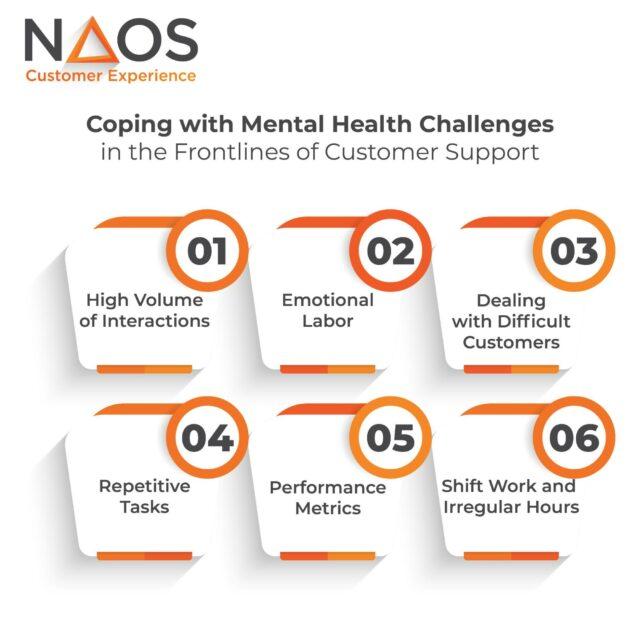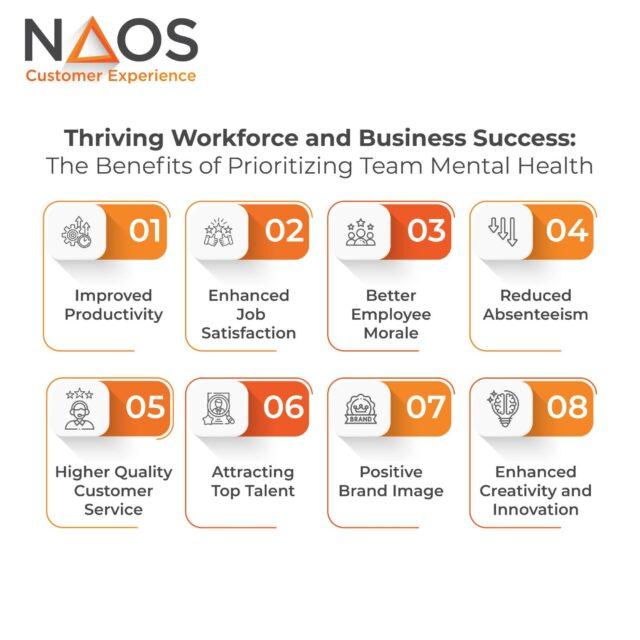Contact centers worldwide are starting to pay attention to the intricate link between Mental Health and Customer Service, especially as emotions run high and customer interactions can be challenging and demanding. Astoundingly, the World Health Organization underscores a stark reality: depression and anxiety account for an estimated loss of 12 billion working days globally every year, translating to roughly US$1 trillion in lost productivity annually. A staggering 1 in 6 individuals (14.7%) declare grappling with mental health challenges in the professional sphere.
Imagine a workplace where your team successfully navigates the stressful waves of customer queries and complaints with a resilient and positive mindset. Progressive organizations are waking up to the vital importance of cushioning mental health in the workplace and crafting robust wellness solutions to scaffold their employees’ success.

Many organizations have understood that supporting mental health at work is in the best interest of employees and employers. They have started developing wellness solutions to keep their employees successful.
In this article, we will highlight the increasing emphasis on mental health in professional settings, discuss the benefits of investing in the customer service team’s mental health, and give managers some practical tips on maintaining good mental health for their teams.
SETTING THE STAGE FOR MENTAL HEALTH AND CUSTOMER SERVICE
The Ripple Effect: Mental Health and Customer Service’s Work Output
Mental health is a crucial aspect of total health, just as physical health and social well-being are. Mental health is an individual’s cognitive, behavioral, and emotional state. Mentally healthy individuals have the resilience to cope with everyday stresses and adverse events while maintaining a positive and realistic sense of self. Employee mental health must be an essential priority for organizations, as human performance and mental health go hand in hand.
Teams in good mental health can reach their full potential. They can quickly adapt to changes in roles and responsibilities and have a better chance of overcoming challenging obstacles. When employees are resilient, they can manage stress, perform better in their jobs, and have fewer absences.
Furthermore, healthy teams can bring constructive criticism to the table that can aid in transforming the company to attract and retain top talents. Creating a mentally healthy workplace generates a positive ripple effect on employee retention and overall business success.
According to a report named “The State of Workforce Mental Health in 2023“, organizations still have much work to do to address mental health in the workplace. The report shows that in 2022, 48% of employees experienced a decline in their mental well-being, and 28% reported feeling miserable in their workplace.

However, the subject is complex, and many companies don’t know where to start to provide a safe environment.
Customer Service Reps On The Frontline To Weathering Mental Health Storms
Since customer service professionals’ raison d’être is to solve problems, their very nature implies exposure to many stress-generating factors.
Hence, customer service roles can come with several potential stressors, which can be as follows:
1- High Volume of Interactions
Customer service representatives often deal with a high volume of interactions, whether through phone calls, emails, or live chats. The constant influx of inquiries and requests can be overwhelming, leading to stress.
2- Emotional Labor
People calling customer services tend to be more unstable and highly emotional as they report a problem and want immediate solutions. On the other hand, agents must maintain a positive and empathetic demeanor, even in challenging situations. This emotional labor can be draining and lead to emotional exhaustion.
3- Dealing with Difficult Customers
Not all customer interactions are pleasant. It’s not unusual for Support representatives to come across angry, frustrated, or rude customers, which can be emotionally taxing and lead to stress and anxiety.

4- Repetitive Tasks
The repetitive nature of some support tasks, such as repeatedly answering the same questions, can lead to boredom and monotony, negatively impacting job satisfaction and mental well-being.
5- Performance Metrics
Customer service roles are subject to performance metrics such as response time, call duration, and customer satisfaction scores. The pressure to meet or exceed these metrics can create stress and anxiety.
6- Shift Work and Irregular Hours
Some customer support roles may require shift work or irregular hours, leading to disrupted sleep patterns and work-life balance issues that can impact mental health.

The combination of these stress factors can result in burnout or a state of emotional exhaustion, cynicism, and reduced job performance.
However, customer support representatives are not the only ones feeling stressed. According to a survey conducted by McKinsey in 2022, customer care leaders face a perfect storm of challenges: call volumes are up, employees are leaving and harder to replace, and digital solutions still need to deliver on their full promise. Add rising customer expectations and decades-high inflation to the mix, and it’s easy to understand why customer care leaders are feeling the pressure.
Employers should start identifying the specific potential mental health stressors in their workplace. That will help them take proactive steps to address them.
ELEVATING CUSTOMER SERVICE TEAMS BY ANCHORING MENTAL HEALTH
Investing in your team’s mental health is a wise and compassionate choice that can benefit employees and the organization. It promotes a positive workplace culture, fosters productivity, reduces costs, and enhances the overall well-being of your workforce, ultimately contributing to organizational success.
Mentally Healthy Teams: Unpacking the Essentials of Collective Psychological Well-being
The concept of Mental Health expands beyond the mental wellness of individuals. It can also integrate into a collective psychological well-being into the team’s dynamic and structure. While an individual’s mental health focuses on their emotional, psychological, and social well-being, mentally healthy teams encompass a wider net, focusing on healthy interpersonal relationships, a supportive environment, and collective resilience.

Key characteristics and components of mentally healthy teams include:
- Supportive Environment: Mentally healthy teams foster an environment where members feel safe, supported, and understood, enabling them to express their thoughts without fear of retribution.
- Effective Communication: Healthy communication, where members actively listen, empathize, and validate each other’s feelings and perspectives, is vital.
- Positive Interactions: Positive interactions and celebrations of team accomplishments build a positive working environment, bolstering the collective mental well-being.
- Leadership Support: Effective leaders play a crucial role in establishing and maintaining the team’s mental health by exhibiting empathy, providing resources, and offering a supportive ear.
Mental health in individuals and teams complements each other. A mentally healthy individual contributes positively to the team, and a supportive team enhances individual mental well-being. A mutually beneficial relationship exists where promoting one aspect impacts the other, fostering a robust, productive, and healthy working environment.
Key Benefits Of Mentally Healthy Teams
- Improved Productivity
Employees with good mental health are more focused, engaged, productive, and, finally, more likely to succeed at work. They work more efficiently and effectively, leading to higher output and better results.
- Enhanced Job Satisfaction
Employees who feel their mental well-being is valued are more satisfied with their jobs. Happy employees are likelier to stay with the company, reducing turnover rates and associated recruitment costs.
- Better Employee Morale
A positive work environment prioritizing mental health creates a sense of belonging and camaraderie among team members. This boosts morale and fosters a more cohesive and motivated workforce.
- Reduced Absenteeism
Investing in mental health initiatives can help reduce absenteeism due to stress-related issues. Employees are more likely to show up for work when they feel supported and less stressed.
- Attracting Top Talent
Companies prioritizing mental health have an edge in drawing in the best candidates. Talents are attracted to organizations that genuinely care about their well-being.
- Positive Brand Image
Organizations that invest in their team’s mental health tend to have a positive brand image. Customers, clients, and stakeholders often view such companies more favorably.
- Enhanced Creativity and Innovation
Good mental health can stimulate creativity and innovation. Employees who are less stressed and more content are often more open to new ideas and solutions.

Focus On How Customer Service Workforce’s Mental Health Shapes Customer Satisfaction
The connection between employee mental health and customer satisfaction is symbiotic. Companies that create a mentally healthy workplace improve employee well-being and directly impact customer satisfaction levels. A mentally healthier workforce delivers better service, leading to higher customer retention, positive word-of-mouth, and, ultimately, increased business success. Recognizing and addressing the importance of mental health is a win-win for employees and customers.
Poor mental health can lead to increased stress levels among employees. High stress levels can impair decision-making and problem-solving abilities, which are crucial when dealing with customer inquiries or resolving issues.
In contrast, mentally healthy Customer Service Representatives have an improved capacity to
- be empathic, enthusiastic, attentive, and responsive to customer needs,
- communicate better with customers,
- make more rational and effective decisions.
Those improved capacities lead to better customer experiences and exceptional customer service.
BLUEPRINT FOR A MENTALLY PROSPEROUS CUSTOMER SERVICE TEAM
Stepping into the customer service arena requires strategic and empathetic approaches toward mental health. By weaving a fabric of supportive strategies and initiatives into the workplace, we lay the foundation for an environment where the mental well-being of employees is not merely a consideration but a priority.
Engaging in the journey of fostering team mental health not only shores up employees’ resilience and productivity but also crafts a pathway toward enhanced engagement and unparalleled organizational triumph.
Develop a Supportive Culture
Creating an environment that encourages open communication and fosters emotional support among team members is essential for success.
Encourage employees, regardless of their position in the company structure, to acknowledge that mental well-being is stigma-free. Let them know they can discuss their mental health concerns and stressors openly.

Mental Health Resources
Appoint a reference person for mental health in the workplace who undergoes thorough training in mental health first aid and supportive communication skills. He or she will be a confidential, accessible point of contact for employees navigating mental health challenges. The reference person provides empathetic, non-judgmental, and confidential support, brings pertinent resources, and facilitates awareness and well-being initiatives like workshops to foster a mentally healthy work environment.
Training and Development on Stress Management
Conduct regular training on stress management, emotional intelligence, and resilience building to help team members navigate challenging customer interactions effectively.
Engage mental health professionals to provide workshops and sessions to educate and empower the team on mental health matters.
Physical Health Initiatives
Promote physical wellness activities like exercise, yoga, or mindfulness meditation, which can also positively impact mental health.
=> You can deepen this topic with our blog article on Mindfulness in Customer Service: Improve Customer Interactions and Agents Well-Being.
Promote healthy habits among the employees, such as getting 8 hours of sleep per night. Sleep problems heavily exacerbate mental health issues like depression and anxiety while hindering emotional intelligence, creativity, and problem-solving abilities.
Regular Check-Ins
Conduct regular one-on-one check-ins with team members to discuss their workload, challenges, and mental well-being.
Ensure managers actively listen and provide support when needed.
Encourage Breaks
Emphasize the significance of taking breaks throughout the workday. Even short breaks can help employees recharge and maintain focus.
Promote Work-Life Balance
Encourage and ensure that team members are not overburdened and have the opportunity to maintain a healthy work-life balance.
Inform employees they are allowed and encouraged to disconnect from work outside their regular hours.
Recognition and Appreciation
Feeling valued can positively impact mental well-being at work. Implement a recognition and rewards system that appreciates team members’ efforts and acknowledges their contributions.
Celebrate achievements and milestones, whether they are personal or professional, to boost morale and motivation.
Conclusion
In conclusion, your team’s mental health is not just an ethical imperative but a strategic advantage. Investing in your team’s mental health can unlock many benefits, including increased productivity, higher job satisfaction, and enhanced organizational success.
Now is the time to take proactive steps to nurture your workforce’s mental health. It starts with acknowledging the importance of mental health and implementing initiatives that prioritize the mental health of your team members.
At NAOS CX, we understand the challenges you face in this journey. We can support you by providing training programs on mental wellness and stress management within your organization to your teams.
Together, we can cultivate a thriving workforce that excels in its roles and contributes to your organization’s long-term success. Contact us to explore how partnering with NAOS CX can foster a mentally healthy workplace, a happier, more engaged team, and ultimately drive your business forward. Your team’s mental health is worth investing in—for them and your organization’s growth.

